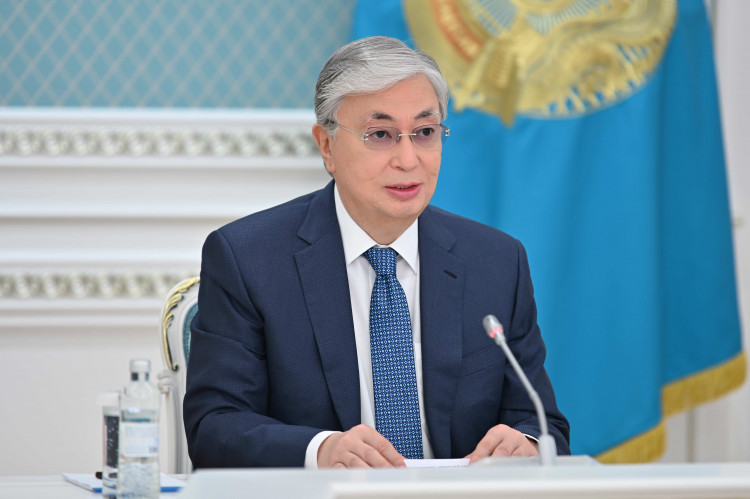NUR-SULTAN – President Kassym-Jomart Tokayev noted his country’s interest in strengthening business ties with the countries of the Asia-Pacific region during the plenary session of the VI Eastern Economic Forum which is taking place in Vladivostok through Sept. 3 in a virtual format, reports the Akorda press service.

President Tokayev addresses the meeting. Photo credit: Akorda press service
In 2020, Kazakhstan’s trade turnover with the region exceeded $43 billion, and Russia, China, and South Korea accounted for 94 percent of it.
“I believe we have great potential for the development of trade and the expansion of its geography. The role of the Eurasian Economic Union is important, promising to become a key player in the global trade and economic community,” said Tokayev.
In his remarks, Kassym-Jomart Tokayev also noted the large potential of the Far East region. He said that the region is of great importance to Kazakhstan as it connects Eurasia with the dynamically developing Asia-Pacific region.
“Kazakhstan, as Central Asia’s largest economy, plans to strengthen its presence in the region. This approach reflects the essence of our country’s relations with partners in Asia. The backbone of Kazakhstan’s Eurasian strategy has been comprehensive cooperation with the Russian Federation, our strategic partner, and ally,” said Tokayev.
Tokayev proposed strengthening cooperation in transport. He spoke in detail about the potential and opportunities of Kazakhstan in the development of transit hubs, including in the context of the Eurasian Economic Union and the Chinese Belt and Road initiative.
“Kazakhstan’s transit has proven its economic attractiveness and reliability. We will therefore continue to improve the infrastructure. We are beginning construction of the new Dostyk-Moiynty railway line to expand transit from China. The total investment will amount to more than $2 billion,” said Tokayev.
Tokayev also supported the idea of the Eastern Economic Forum to create new forms of cooperation to unlock the potential of the region. He said, “it is in our common interest to find new areas for growth, which will attract investments, create jobs and ensure sustainable growth in the future.”
Kazakhstan and Russia have several successful projects in many areas, including mining, metallurgy, digitization, vaccine development, finance, space, oil and gas, and renewable energy.
“Attracting foreign investment is an unconditional priority of our state’s economic policy. Kazakhstan has attracted more than $365 billion in direct foreign investment. Even during the last crisis year, the net inflow of investments in Kazakhstan grew by 35 percent,” he said.
Tokayev described the transition to low-carbon development as one of the most important topics of the forum. Though there are certain challenges associated with the reduction of investment in the coal industry and the reduction of funding for the oil and gas sector, these measures create risks for the economies and can lead to shortages of resources, rising inflation, and lower living standards.
“I believe that we should be as pragmatic and coordinated as possible on this issue. Each country will have to undergo a complex transformation of its technological and economic structure. And this is certainly a challenge for national economies. But at the regional and even more so, at the global level, only together can we win,” said Tokayev.
At the forum, Tokayev reiterated the need for exploring nuclear energy prospects.
“In my address to the people of Kazakhstan, I set the task to study the possibility of creating a nuclear power industry in Kazakhstan. In doing so, it is important to give due consideration to the urgent needs of the state, of course, including citizens and businesses. I believe that the time has come to substantially consider this issue because Kazakhstan needs a nuclear power plant,” Tokayev said.
Along with Tokayev, Russian President Vladimir Putin and Mongolian President Ukhnaagiin Khuresukh also addressed the virtual meeting.
President of China Xi Jinping, Prime Minister of India Narendra Modi, and Prime Minister of Thailand Prayut Chan-o-cha addressed the participants with prepared video greetings.
